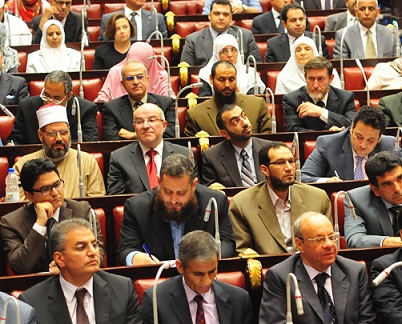CAIRO: Telecoms tycoon Naguib Sawiris said he would muscle in and enter any market available, regionally or internationally, because opportunities are becoming scarce.
“Opportunities remaining in telecommunications are only a handful. Penetration is gaining [momentum]. Markets have become saturated, and obtainable licenses are diminishing, he said.
His remarks came amid talk of OT’s interest in acquiring a license in Lebanon, despite the country’s political instability. “OT is used to operating in war-stricken markets, and compared to Iraq, Lebanon is heaven, he said. “It is no longer an issue of risk but an issue of scarcity that could lead to further surges in prices.
He cited Etisalat Egypt as an example, saying that they paid the staggering price of LE 16.7 billion to acquire the third mobile license because “they saw an opportunity on the Egyptian market, which is still under penetrated.
Meanwhile, Sawiris said an international telecommunications licenses comes with a hefty price tag, which can be an obstacle to acquiring it despite its appeal as a business opportunity.
Last July, the Ministry of Communications and Information Technology agreed to sell licenses for direct long-distance calling to Egypt’s three mobile operators, putting an end to Telecom Egypt’s monopoly over mobile international calling.
“The National Telecom Regulatory Authority (NTRA) set the price at LE 1 billion plus revenue shares. With that price, there’s nothing left for revenue shares, he said.
Currently, mobile operators can only provide international roaming services via Telecom Egypt (TE) against a specific revenue share.
Etisalat Egypt, the country’s third mobile operator, was the first company to apply for the international telecommunications license last October. Meanwhile, Mobinil and Vodafone Egypt asked for a grace period until the end of 2007 to decide whether or not they would apply for the license.
“In order to fully liberalize the telecommunications sector, the market should be opened for more competition, which is still missing in international gateway and landline licenses, Sawiris pointed out. “The NTRA should [simplify] acquiring the international gateway in a way that does not jeopardize TE [or] lead to such an upsurge in prices.
He added that international roaming with TE has its deficiencies. “In Hurghada, for instance, you need to try three times until you get your call through because the frequency is quite low. Who will be patient with such a delay? Tourists will switch to another operator.
Meanwhile, MCIT Minister Tarek Kamel announced last summer that Egypt would offer a license to operate a second landline network, ending years of monopoly by incumbent operator TE. The license automatically grants operators with the international gateway. Several mobile operators have shown interest in obtaining the license.
However, the landline license is not a practical solution to obtaining the international gateway, says Sawiris, because it comes with a catch. “The fixed-line license will come at a high price, much higher than that of the international gateway, so it is not a good alternative, he said. “The fixed-line network is much more complicated to run than the mobile network.
In the meantime, he revealed intentions to sell OT’s fixed-line joint venture in Algeria. Still, the deal to sell the Consortium Algerien de Telecommunication (Lacom) – a joint venture with TE – may not go through because of the Algerian regulator’s preferential attitude towards the country’s state-owned operator, Algerie Telecom.
Sawiris, on the other hand, is not bullish on 3G services and does not see huge potential for its growth. “The most widely used applications are voice, sms, and e-mail. So far, 3G services have not [picked up].
Mobinil inked last October an agreement with the NTRA, granting it a 15-year 3G license for LE 3.34 billion ($602.8 million). The agreement stipulates that Mobinil first pay an undisclosed lump sum in October 2008 and then allocate the remaining balance in four installments, with the first payment due by April 2008.
“3G is much needed first for the spectrum that we are running out of. We are short of frequency rates, and the only way to increase them is via the 3G license.
Indeed, Mobinil’s market share is booming, recording some 15 million subscribers last month, up from 10 million at the start of the year.
“At this growth rate, we can reach 20 million next year, a figure that will eat up our spectrum.



